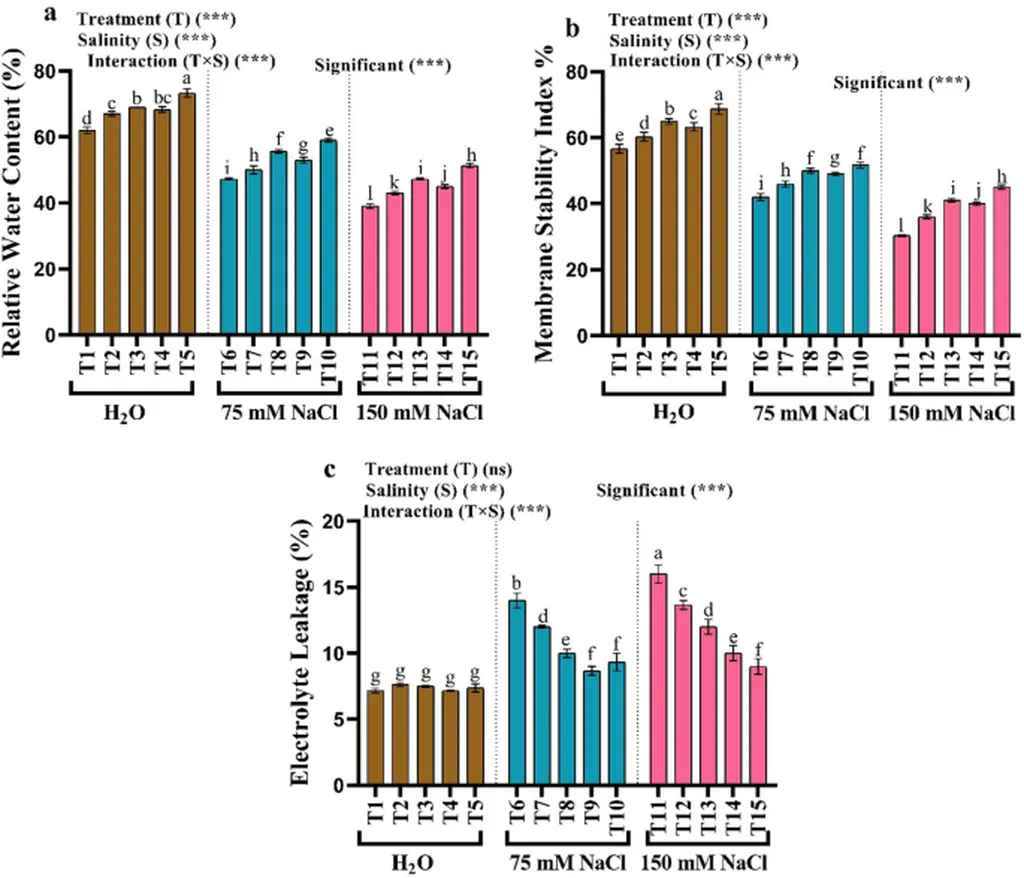In the heart of Saudi Arabia’s Al-Ahsa region, a groundbreaking study led by Dr. Hossam El-Beltagi from the Agricultural Biotechnology Department at King Faisal University is offering new hope for farmers battling the age-old enemy of crops: soil salinity. The research, published in the esteemed journal *Plant Protection Science* (translated to English as “Plant Protection Science”), explores innovative ways to mitigate the detrimental effects of salinity on broad beans, a vital crop in many agricultural systems.
Soil salinity is a global issue, affecting over 20% of irrigated lands worldwide. It stifles plant growth, reduces yields, and poses a significant threat to food security. Dr. El-Beltagi’s study delves into the potential of foliar application of salicylic acid (SA) and proline (Pro), both individually and in combination, to enhance salinity tolerance in broad beans.
The experiments revealed that salinity stress significantly hampers plant growth, chlorophyll pigment content, relative water content, and seed yield. However, the foliar application of SA and Pro, either separately or together, showed promising results. “The combined application of Pro and SA was more effective in mitigating salinity stress’s harmful effects than using either substance alone,” Dr. El-Beltagi explained. This finding could revolutionize farming practices in saline-prone areas, offering a simple yet effective solution to boost crop resilience and productivity.
The study also highlighted the enhanced activities of antioxidant enzymes, including catalase, peroxidase, and superoxide dismutase, following the treatments. These enzymes play a crucial role in protecting plants from oxidative stress, a common consequence of salinity stress. Moreover, the treatments improved the nutritional quality of the seeds, increasing their nitrogen, phosphorus, potassium, and crude protein content.
The implications of this research extend beyond broad beans. As Dr. El-Beltagi noted, “The principles we’ve uncovered could be applicable to other crops, potentially transforming agriculture in saline environments.” This could be a game-changer for the energy sector as well, particularly in bioenergy production. Many bioenergy crops, such as switchgrass and miscanthus, are known to tolerate saline conditions. Enhancing their salinity tolerance could boost bioenergy production, contributing to a more sustainable energy future.
The study opens up new avenues for research and development in agritech. Future studies could explore the optimal concentrations and application frequencies of SA and Pro, as well as their potential in combination with other treatments. Additionally, the underlying mechanisms of how these substances enhance salinity tolerance warrant further investigation.
In the face of climate change and increasing soil salinization, Dr. El-Beltagi’s research offers a beacon of hope. By harnessing the power of plant biochemistry, we can enhance crop resilience, secure food supplies, and pave the way for a more sustainable future. As the world grapples with the challenges of feeding a growing population and transitioning to renewable energy, such innovations are not just welcome; they are essential.

